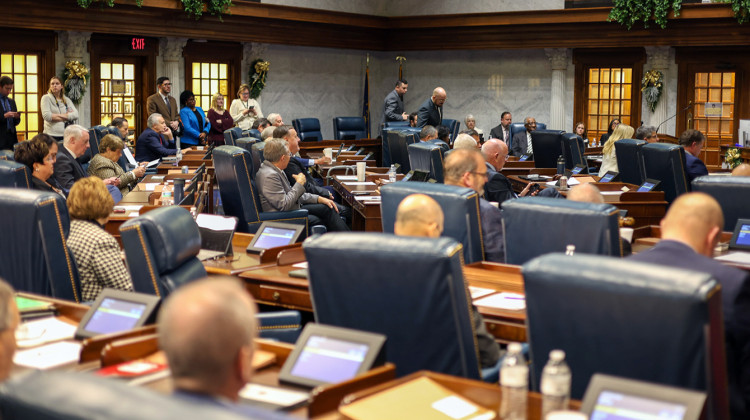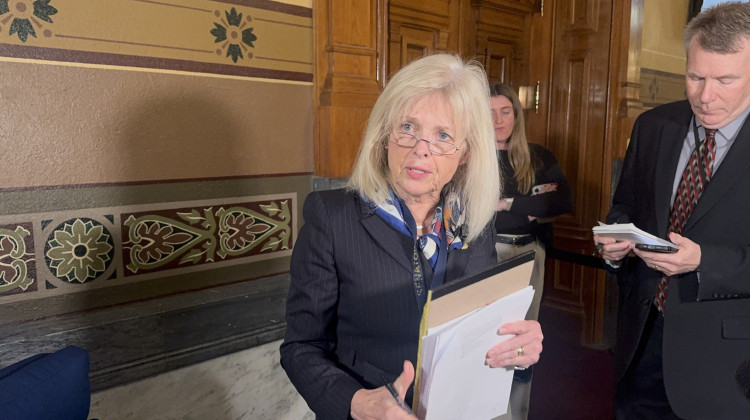INDIANAPOLIS -- Indiana came closer than it’s ever come during the last session to joining the ranks of states with bias crime, or hate crime, laws.
The Associated Press recently found that 52 percent of Indiana police agencies did not file voluntary hate crime reports with the FBI between 2009 and 2014; that’s three times the national average of 17 percent.
Bias crime, or hate crime, laws punish the motivation behind a crime – for example, if a person attacks someone because of the victim’s race, religion, or gender, the attacker could receive a harsher punishment. Indiana is one of only five states without such a law…though it’s getting closer to changing that.
A bias crimes bill passed the Senate 34 to 16 last session before dying in the House.
Did The LGBT Rights Debate Stall Hate Crime Legislation?
“I believe there is a legitimate shot in 2017,” says Chris Paulsen of LGBT rights group Freedom Indiana.
But Pastor Ron Johnson doesn’t think last session’s progress should be a harbinger of things to come. Johnson, who heads the religious conservative organization the Indiana Pastors Alliance, says groups like his had their attention on an LGBT rights bill last session.
“There was so much focus on what was taking place there and trying to keep our religious liberties from being eroded that frankly, I think this slipped in through the side door,” Johnson says.
House lawmakers who killed the bias crimes bill insist the LGBT debate played no role. Paulsen’s not so sure but notes she and others advocating for LGBT rights and the bias crimes bill did their best to keep the issues separate.
“There’s plenty of states that don’t have full LGBT rights that still have bias crime laws,” Paulsen says.
Critics Say A Hate Crimes Law Isn't Necessary
But opposition to the bias crimes bill goes beyond LGBT issues. Indiana’s bias crimes bill makes the motivation for a crime what’s called an “aggravator,” meaning it’s something a judge can consider when sentencing.
Republican Rep. Tom Washburne, the committee chair who opted not to hear last session’s legislation, says the bias crime measure isn’t necessary.
“It specifically says in the Indiana code that the criteria listed in the aggravators and the mitigators do not limit the matters that the court may consider in determining the sentence,” Washburne says. “And so, in Indiana, we already can consider a lot of what Senate Bill 220 was trying to put in there.”
That’s true, says Marion County Prosecutor Terry Curry. But Curry, who’s part of a coalition urging lawmakers to pass the bill, says bias crime offenses aren’t the same as typical crimes.
“That perpetrator is doing so to send a message and so our response is simple: we should send a message back, as a community, that we are going to hold you even more accountable for this offense,” Curry says.
But Washburne says enumerating a specific set of victim characteristics is just government picking winners and losers.
“Our list, you know, includes if somebody beats you up because of your disability or national origin but it doesn’t have it if they beat you up because you’re obese,” Washburne says. “So are we sending a message to the obese community that you don’t matter in our society?”
David Sklar is from Indianapolis’ Jewish Community Relations Council. He says the U.S. Supreme Court, in its ruling affirming the constitutionality of bias crime laws, outlined why such laws include a specific list of victim characteristics.
“There is a compelling government interest in protecting these individual classes because we have a lot of data that demonstrates that there is discrimination and targeting of these particular classes,” Sklar says.
But Pastor Johnson says bias crime laws create a disproportionate system of justice.
“If you can give me one example of a church that has been vandalized that actually was able to prosecute the perpetrators on the basis of hatred towards Christ or Christianity, I’d like to see that,” Johnson says. “If you can give me examples of hate crimes perpetrated towards white individuals on the basis of their whiteness, I would like to see that.”
According to the FBI, in racially-motivated bias crimes nationwide in 2014, nearly 23 percent involved victims of anti-white bias. Among anti-religious bias crimes, nearly 9 percent of incidents involved anti-Catholic or Protestant bias.
As for next session, Washburne says he can’t guarantee a bias crimes bill will get a hearing.
“I can say, I did not sense a great deal of push behind this particular piece of legislation – in the House, anyways,” Washburne says.
Bias crime law backers say that perspective is why educating lawmakers on the need for such a bill is their top priority heading into 2017.
 DONATE
DONATE









 Support WFYI. We can't do it without you.
Support WFYI. We can't do it without you.